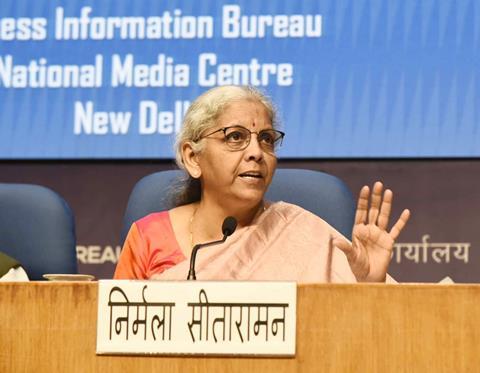
INDIA: Presenting the Indian government’s Interim Budget on February 1 for 2024-25 ahead of elections due in April and May, Finance Minister Nirmala Sitharaman announced that a further increase in capital expenditure of 11·1% to reach Rs111tr or 3·4% of GDP.
This in turn will boost Indian Railways’ capital spending allocation from Rs2·602tr in 2023-24 to Rs 2·652tr in 2024-25. The package includes budgetary support for IR of Rs2·522tr, up from Rs2·402tr in the current financial year.
Referring to what she described as ‘unprecedented’ budgetary support for rail over recent years, Sitharaman pointed to three major spending priorities. These would see corridors developed to focus on energy, mineral and cement traffic; port connectivity; and high traffic density routes.
‘The projects have been identified for enabling multi-modal connectivity’, she explained. ‘They will improve logistics efficiency and reduce cost. The decongestion of high-traffic corridors will also help in improving the operation of passenger trains, resulting in safety and higher travel speed for passengers.’ She believed that the investment in upgraded routes would complement IR’s two existing Dedicated Freight Corridors, ‘accelerating our GDP growth and reduce logistic costs’.
The government said the spending plan would cover significant investment in rolling stock, including the refurbishment of 40 000 loco-hauled inter-city coaches to standards equivalent to the latest Vande Bharat trainsets.
Sitharaman reiterated the government’s desire to drive investment in urban and suburban rail projects. ‘We have a fast-expanding middle class and rapid urbanisation is taking place’, she explained. ‘Metro rail can be the catalyst for the required urban transformation. Expansion of these systems will be supported in large cities, focusing on transit-oriented development.’
Revenue at IR is budgeted to increase from Rs 2·586tr in 2023-24 to Rs2·785tr in 2024-25, while spending from internal sources is projected to rise from Rs2·566tr to Rs2·757tr. Income from the operation of both freight and passenger trains is forecast to grow in the next reporting period. IR’s operating ratio for 2024-25 is predicted to be 98·2; a slight decline from the 98·65 expected for the current financial year.
Concluding her parliamentary address, Sitharaman said the government’s Viksit Bharat (developed country) vision for the centenary of independence in 2047 would ‘focus on outcomes, not on outlays’. Expenditure would be driven by the ‘imperative of securing fast and inclusive growth consistent with rising aspirations of the population’, she emphasised.

















